okana ika

Okana Ika is Odu number 131 in the Ifá hierarchy. In it, Orunmila emphasizes the importance of making sacrifices to prevent fatal outcomes and guide towards a favorable destiny.
Overview of the Odu of Ifa Okana Ika
In the sign of Ifa okana ika, highlights drought, protection against enemies through offerings to Elegua, the clothing of Obatalá's children, and ambition. He also highlights the spiritual relevance of certain practices and prohibitions, such as diet and specific rituals, emphasizing the need for caution and respect towards spiritual forces and nature.
What is born in the Odu of Ifá Okana Ika?
- The drought.
- Let Elegua eat bananas to free the Awó from the enemies.
- That Obatalá's children do not dress in black.
- The ambition.
- The process of stick garments assembled by Ifá.
- The sowing of the last day of the Ifá ceremonies (Iyoye).
- Okana Ika talks about the ungrateful.
- Obatalá changed black clothes for white.
- People wanted to kill Obatalá's son.
What does the Okana Ika sign talk about?
- The three faces of Orunmila speak: Orun, Ifá and Orula.
- Oshosi must be received urgently.
- Chickpeas and fruits are not eaten.
- It is sung: "Ode Lade Malawo, Ode Lade Malawo."
- Talk about spiritism.
- The roof of the house (Babawua) is fed for a good amount of money (Iré aye umbo).
- The Awó can live with two sister women.
- Dissected cat claws are added to Ifá.
- To be well, open and close the front door three times and once a week let the water run from the fountain or faucet.
The Okana Ka sign points out:
- It signals revolution and loss at the same time; loss of home or spouse.
- As long as the guardian angel does not want to, there will be no one to kill him.
- The diseases are: belly, internal diseases such as the liver, kidneys, etc., spine and stomach.
- The herbs of the sign are: Caisimon, clover, basil, oriye, white and purple pigweed.
To fully understand orunmila and its importance in the Yoruba religion, don't miss our latest article.
Analysis and Reflection of the Ifa sign Okana Ka
Okana Ka is a sign that warns about the dangers of excessive ambition and the importance of honesty and legality. It reminds us that life is full of challenges and that facing them with courage and righteousness will lead us to earn the consideration and esteem of everyone. In this Odu, the transformation from the negative to the positive is possible through respect for traditions, making appropriate sacrifices, and adhering to a high moral code.
Economic Aspects
Economically, Okana Ka suggests the possibility of revolution and loss, but also prosperity if divine advice is followed. Performing ebbó (sacrifice) and respecting the deities, especially Orisha Oko, can bring tangible benefits derived from the land and agriculture. This Odu advises feeding the roof of the house to attract money luck, symbolizing the need to care for and maintain our home and work spaces to ensure the flow of positive energy and prosperity.
"Salud"
In health, Okana Ka speaks of diseases related to the belly, internal illnesses such as the liver and kidneys, the spine, and the stomach. The recommendation not to look directly at the Sun and to avoid certain foods points out the importance of taking care of our environment and eating habits to stay healthy. The practice of specific rituals and the use of medicinal herbs such as caisimon, clover, basil, and white and purple pigweed are essential for healing and physical well-being.
Religious Aspects
This Odu emphasizes the need for spiritual commitment and making sacrifices to avoid misfortunes and ensure a favorable destiny. The connection with Orunmila and obedience to his teachings are crucial, as is the special relationship with Orishas such as Obatala and Oshosi, who offer protection and guidance. The prohibition of Obatala's children wearing black and the change to white clothing symbolize the search for purity, peace, and clarity in our spiritual lives.
Personal relationships
In love, Okana Ka warns about the danger of relationships driven by ambition or lack of honesty. The possibility of living with two women, sisters or mother and daughter, reflects the complexity of human relationships and the need for clarity and truth in our emotional ties. This sign teaches that mutual respect, honesty, and commitment are essential to building stable and lasting loving relationships.
In summary, Okana Ka is an Ifa sign that calls us to reflect on our integrity, our actions and their repercussions on all aspects of our life. He reminds us that, despite challenges and temptations, staying true to our principles and respecting divine and earthly laws will lead us on a path of growth, prosperity, and inner peace.
You may also like: All about the Odu Ika Kana
Recommendations:
- Maintain Honesty and Legality: It is essential to live and act with integrity, honesty and legality in all aspects of life.
- Make Appropriate Sacrifices: Sacrifices and offerings are crucial to avoid misfortunes and ensure a favorable destiny. It is important to follow the advice of Ifá and make the sacrifices without delay.
- Beware of Excessive Ambitions: Caution must be taken with ambition and ensure that it does not lead to dishonest or harmful actions.
- Respect and Follow Traditions: It is essential to respect spiritual and religious traditions, including the specific practices and rituals recommended in this Odu.
- Protect Health: Pay attention to health, especially diseases related to the belly, spine and internal organs. Use the recommended medicinal herbs.
- Take care of your home and work spaces: Perform rituals to attract luck and prosperity, such as feeding the roof of the house.
- Foster Honest and Respectful Relationships: In personal relationships, especially romantic ones, promote honesty, respect and clarity.
Prohibitions:
- Not Wearing Black (for Obatala's children): Avoid wearing black clothing as a symbol of purification and spiritual clarity.
- Avoid Forbidden Foods: Do not consume chickpeas or certain fruits, in line with the dietary restrictions specified in this Odu.
- Do not look directly at the sun: This prohibition suggests the importance of protecting oneself from potentially harmful influences or energies.
- Refrain from Dishonest Behavior: Avoid any form of ambition that could lead to dishonest or unfair actions.
- Avoid Conflicts and Useless Discussions: It is especially important not to intervene in fights or conflicts to avoid being harmed.
Sayings of the Odu of Ifa Okana Ka:
- The song of the guataca turns the forest into food.
- When a woman takes a hoe, the man cannot take her place.
- When we don't sacrifice death it can be premature.
«The song of the guataca turns the forest into food» highlights the transformation of effort into sustenance. This saying highlights how hard work and perseverance can change an unfavorable situation into one of abundance and prosperity, turning what is inaccessible or arid into a source of life.
Odu Okana Ika Ifa Code of Ethics:
- He who does wrong and does not do good, does it for himself.
Find out more Obatala, the Yoruba deity of purity and peace, in our specialized article.
Ifá says in Okana Ika:
In an ordinary search, the person is warned that he must make a sacrifice to avoid being killed for his possessions. If she appears with Ayeo (bear), that is, foreshadowing danger, she should not intervene in fights to avoid being killed.
The person is instructed to make a sacrifice before embarking on a scheduled trip, to prevent difficulties with other people whom he or she may overshadow at that location.
When this Ifá (Okana Ka) manifests in Igbodu, the need to make a sacrifice is communicated to the person.
It is possible that he was a Christian before receiving his Ifá. His Christian faith did not prevent his connection with the Ifá lineage. When looking for a partner, he should investigate his background in divination before getting married. It is important to avoid arguments with his mother-in-law. In an ordinary registration, the person is reminded of the importance of having his own Ifá and, if he already possesses it, he should not abandon it even if he decides to adopt another faith. He must perform sacrifices to the Elders of the Night.
When Okana Ika performs at Igbodu, the person is warned that he must honor Eshu immediately and that he must start a new life near the sea to prosper. In an ordinary record, she is told that she must offer Eshu a goat and Ogún a rooster to receive a pending material benefit.
Prayer of the Odu Baba Okana Ka:
OKANA KA ADIFAFUN KANA KANA TINSHELAYE EYE AKO META IJAJU
EYELE LEBO, EURE, AKUKO LEBO KAFEREFUN OLOKUN, OBATALA, YALORDE,
YEMAYA ATI ELEGBARA.
You may also like: Ifa Okana Meyi sign
Meaning of the Sign of Ifa Okana Ika
The Odu Okana Ka addresses themes of courage and honesty essential to preventing misfortune. It is crucial to maintain a firm position on what you believe. This Odu reveals that during an ordinary registration, the person is warned about the need to make sacrifices to ensure a long and prosperous life, as well as a happy ending. Action must be taken without delay to avoid losing prosperity. It is important to make two specific sacrifices that were marked to the mushrooms.
In this Odu, drought was born and the importance of receiving Oshosi is emphasized, in addition to avoiding the consumption of chickpeas and fruits. It is said that anyone who deals with a cat always ends up scratched, so caution must be taken, especially with the godson, who must be given a stuffed cat claw as protection.
This sign also refers to spiritualism and highlights the practice of feeding the roof of the house (Babawa) to attract economic luck (Iré Aye Umbo). Among the particularities of Okana Ka, it is mentioned that the Awó has the possibility of living with two sisters at the same time or with a mother and daughter.
The action of touching your hand and chest three times is highlighted and, to maintain well-being, it is recommended to open and close the door of the house three times, in addition to letting the water run from the tap once a week.
This Odu marks a time of simultaneous revolution and loss, including the loss of home or spouse. However, he assures that as long as the Guardian Angel does not allow it, no one can cause death.
Obatala's children have been prohibited from wearing black, reflecting the moment when Obatala switched from black clothing to white. This transformation symbolizes the rejection of negative energies and the adoption of purity.
Finally, the person ruled by this Odu must always be legal, honest and virtuous to earn the consideration and esteem of everyone. In addition, one should be careful with a light-living red woman who has a defect, warning about negative influences and dangerous relationships.
Pataki of the sign of Ifa Okana Ka:
Okana Ika the Treacherous and Ungrateful
In Okanla, land of the mountains, lived Awó Biya Kaiyeke. One day he received a visit from a brother (Abure) named Okana Ika, Awó Osologue. As soon as Okana Ika reached Okanla and he saw the land, ambition and the desire for betrayal invaded him, entering the place with the chant: “Okana Ika lashire bobo omo laye.”
The entire town came out to watch it from their doors. Okana Ika appeared before King Awó Biya Kaiyeke, claiming that both were from the same place and had known each other since they were children. Biya Kaiyeke, happy, offered him shelter and everything he had, saying: "Although my palace is in ruins, you can use it for whatever you want, since you are from my land and you know my family. "Who better than you can I offer it to?"
The palace of Awó Biya Kaiyeke was like a large tree within the religion, known as Oshe. Okana Ka, after seeing everything, proposed: «I can fix this palace, but on one condition: that you allow me to live here for a long time. Furthermore, present me to your subjects as the most intelligent in the palace.
Awó Biya Kaiyeke agreed to the request of Okana Ika, who began to create a good atmosphere in the kingdom, stating that the king had sent for him to solve the bad situation they faced, since the king himself could not do it, and that If they wanted, he could stay there permanently.
A loyalist of the king told him everything that Okana Ka was doing behind his back. The king not only did not believe him, but also punished him for being a liar. Days later, the king met with Okana Ika and reminded him of his promise, to which Okana Ika responded that the king must leave the lands. The king asked for a few days to think about it. Okana Ika gave him a three-day ultimatum.
Understanding the ambition of his "brother", the king sought the advice of Orunmila, who revealed to him that he was the representation of three characters on Earth: Awó Orun, Awó Nifa and Awó Inle Osanyin. Orunmila performed Osode for him, he saw Okana Ka and advised him to perform an Ebó with a dove and fallen leaves from her palace. After a specific ritual, the king had to release the dove and bury the Ebó where it perched, near a stream of fresh water.
The king returned to his palace and, given Okana Ika's presumption of victory, announced a party in his honor, promising him the command of the kingdom. During the celebration, the king sang, and the people, recognizing Okana Ika's betrayal and ungratefulness, turned against him, leaving him seriously wounded by his ambition and lack of scruples.
Explanation: The story of Okana Ika the Treacherous and Ungrateful teaches that excessive ambition and betrayal, even towards those who offer us their hospitality and trust, only lead to dishonor and rejection by the community. Loyalty, gratitude and respect are fundamental values that ensure our integrity and honorability in any society.
You may also like: All about the signs of Ifa
Okana Ka Ifa Traditional
ÒKÀNRÀN ÌKÁ
Òkànràn kárò káro
Babaláwo Kannakánná
Ló día fún Kannakánná níjó tí n fomi ojú sògbérè omo
Òun le bímo báyìí?
Wón ní ó rbo
Wón ni Òja méjì lebo è
Yóó fi òjá méjì kún ebo ru
Ó sì gbébo nbè ó rbo
Eye mòmò róso
Ó mòmò gbàjá ò
Eye wé gèlè funfun gbòò
Ayé ye é tan
Lo bá bójó
Ní n seyé wé gèlè funfun gbòò
Eye wé gèlè funfun gbòò
Eyé mòmò róso or gbàjá ò
Eye wé gèlè funfun gbòò.
Ifá says that it would be fine with this person. Your things cannot be spoiled. But he must offer sacrifice.
Òkànràn káro
It is the Babaláwo of the Falcon
Who made divination for the Falcon on the day she was crying because she had no children
'Would I have children'?
They told him to offer sacrifice
They said Two straps is for sacrifice ',
They advised him to add these two straps to the rest of The Articles of Sacrifice
She heard about the sacrifice and performed it
The bird had wrapped a cloth around it
And had put a belt around her waist
The bird tied a white scarf
Life was pleasant
She was dancing
She was singing 'The bird tied a white scarf'
She tied a white scarf
The bird wrapped around a cloth and had taken a leash
The bird tied a white scarf.
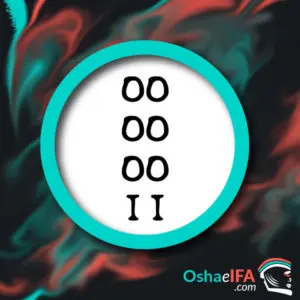
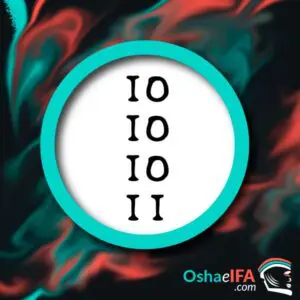
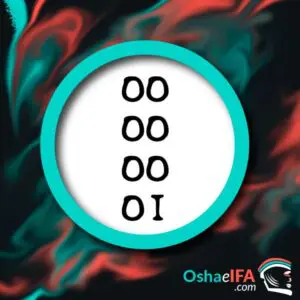



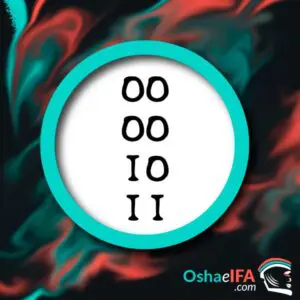
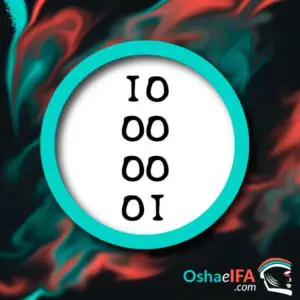
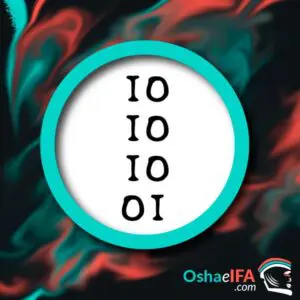

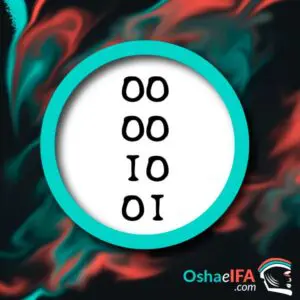
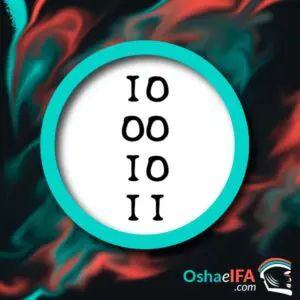
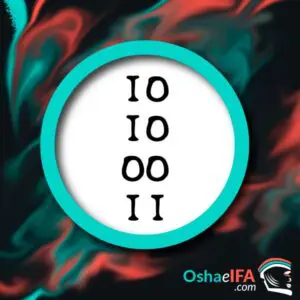

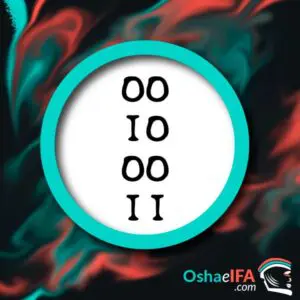
Very good